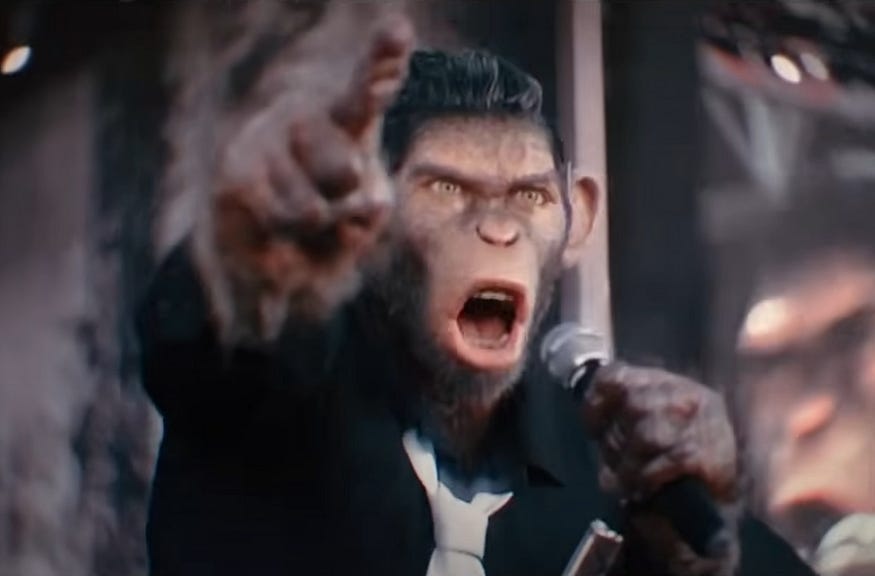Film Review — Better Man
Michael Gracey’s audacious musical biopic features Robbie Williams portrayed as a chimpanzee
Connoisseurs of genre definition pedantry such as yours truly have fun with films like Better Man, pointing out with nit-picking satisfaction that it falls under the definition of “musical biopic” rather than “biopic about a musician”. Like Rocketman (2019), this unusual take on Robbie Williams’s story features numbers in multiple off-stage locations, crossing the fantastical boundary to “musical”. Whilst it isn’t as good as Dexter Fletcher’s aforementioned Elton John story, Better Man is an audacious piece of work with a central conceit that shouldn’t work, yet somehow does.
Said conceit is that Robbie Williams is played by a CGI chimpanzee. Why? As he says in the film, he has always felt less evolved. The idea could have been hugely distracting, but against the odds, a few minutes into this, I was sold. Williams voices himself as an adult, Jonno Davies voices his childhood self, and Adam Tucker sings his vocals. The latter is a key counterintuitive artistic decision that frames the film rather well, given the flights of fancy it contains, enabling the songs to take on slightly different emotional meanings depending on narrative context.
The screenplay — by Simon Gleeson, Oliver Cole, and director Michael Gracey — is less radical, taking the usual route seen in umpteen films of this sort. There’s a bingo card of obscure origins, childhood trauma, fluffed audition to big break, huge success, empty sex, substance addiction, lashing out against loved ones, all-is-lost despair, and the inevitable redemption. Such are the clichés of the genre, but in this case, they are absorbing and, at times, rather moving.
Contradictions in Robbie’s character are well-observed, with his outward determination and (frequently foul-mouthed) defence mechanism of self-deprecation constantly undercut by imagined repetitions of discouraging statements made to him as a child. There’s also a refreshingly frank look at how envy drives success in the pop business with Robbie jealous of Take That bandmate Gary Barlow (Jake Simmance), who initially doesn’t take his songwriting abilities seriously. Later, Robbie is jealous of Oasis frontman Liam Gallagher (Leo Harvey-Elledge) and, most devastatingly, of his girlfriend Nicole Appleton (Raechelle Banno) when she and the rest of All Saints have a number-one hit.
Of course, Robbie had several number-one singles as a member of Take That, but he wants success as a serious solo artist. This is a familiar story, one also seen with Wham! (with George Michael) and The Beatles (with John Lennon). Yes, I just put Wham! and The Beatles in the same sentence. I’m not a pop snob, unlike Robbie at this point in the story, when he is snooty about Take That. But of course, Take That were fabulous in their own right, as this film reminds us. (One of my favourites, “Relight My Fire”, gets a decent airing.)
However, the key force behind Robbie’s drive for success is the relationship with his father. Heartbreakingly played by Steve Pemberton, Peter Williams is a rather pitiful Sinatra-loving lounge singer who devastated Robbie by leaving his mother, Janet (Kate Mulvany). Yet Robbie adores him, craves his attention, and feels a need to prove himself by becoming famous to gain his affirmation.
In the supporting cast, we also get Damon Herriman playing Nigel Martin-Smith, Take That’s band manager, and Tom Budge as Guy Chambers, a songwriter who helps Robbie to solo success. Both are the subject of amusing jokes about legal constraints concerning their portrayal (as revealed in Robbie’s narration), leaving the viewer more than able to fill in the blanks. Alison Steadman also crops up as Robbie’s grandmother, Betty, whose unconditional love and constant encouragement proved vital in the aftermath of his father’s departure. Some of the most touching moments in the film involve their bonding over watching The Two Ronnies on television.
I wasn’t keen on Michael Gracey’s 2017 musical The Greatest Showman (I found it thematically superficial and didn’t care for the songs), but here, Gracey stages the numbers with tremendous panache. For instance, “Rock DJ” is reimagined in the streets of London to tremendously energising effect. Later, when Robbie plays “Let Me Entertain You” at Knebworth, there’s an extraordinary climax to a recurring motif whereby Robbie hallucinates his self-loathing inner demons as audience members (I shan’t spoil it). I was sorry my all-time favourite Robbie Williams single “No Regrets” was omitted, but I suppose one cannot have everything.
The film is a trifle overlong, with a Sinatra number in the Albert Hall possibly constituting a heartstring tug too far. Nonetheless, I hugely enjoyed Better Man. It will also prove nostalgic to people of a certain age, with everything from screaming Take That fans to badly behaved Brit Award ceremonies leaving one feeling oddly wistful. Sorry, America, but our pop scene was far better than yours in the 1990s.
As a final thought, perhaps the most compelling reason for portraying Robbie Williams as a chimpanzee (and therefore “unevolved”) is the film’s notion that fame freezes a person’s emotional development at the age at which they became famous. In Robbie’s case, he was little more than fifteen. He got everything he ever wanted, yet ultimately observes that isn’t good for anyone. It’s a poignant spin on fame-won’t-make-you-happy platitudes that often prove unconvincing in films of this sort. Here, it genuinely rings true.
(Originally published at Medium.)
The Dillon Empire beyond Substack
For a full list of my published novels, click click here.
For more on my novels and other fiction projects, click here.
For my Patreon page, click here.
For my Medium page, click here.





